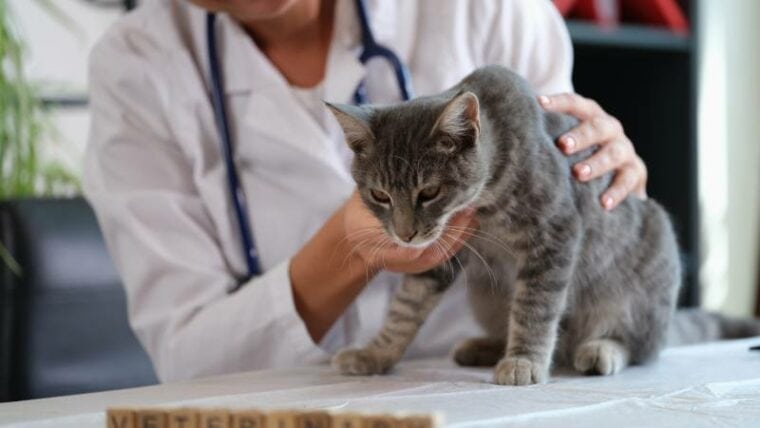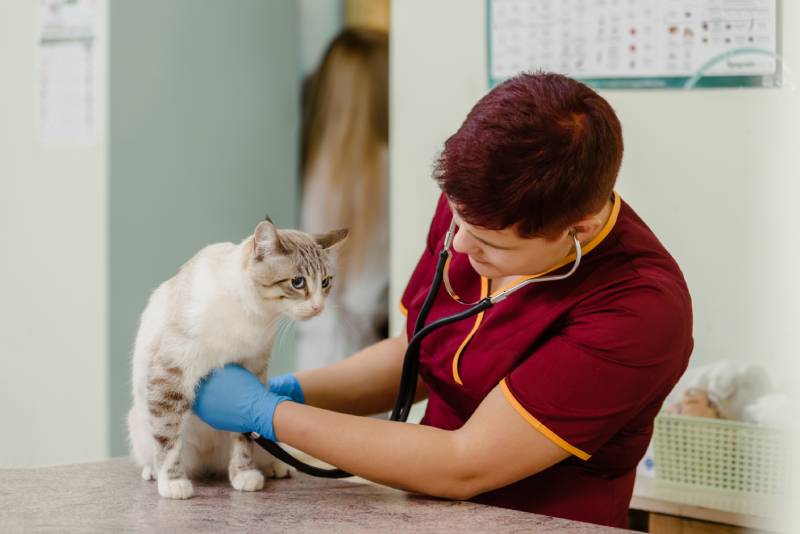
Cats can lose weight for all sorts of reasons. Many cats are overweight or obese. In these circumstances, it may be healthy for your cat to lose a bit of weight. However, even if your cat is already overweight, it isn’t healthy for them to lose weight suddenly. Usually, there is a reason for this—and that reason is rarely good.
Therefore, if your cat has suddenly lost weight, you need to take them to the vet. Once weight loss is noticed by the cat’s caregiver, it is likely already extreme and needs to be considered by a vet (who will order tests to ensure there isn’t an underlying issue).
However, there are some cases where weight loss can be normal to some extent. For instance, after pregnancy, cats will likely lose weight. This is normal in most cases.
However, some cats may continue to lose weight as they nurse the kittens, especially if they are not eating an appropriate and balanced diet. So again, make sure to consult with your vet if your cat is losing weight, as our guidance, although approved by a veterinarian, is not a replacement for specific veterinary advice and clinical examination.
What Causes Sudden Weight Loss in Cats
There are many different reasons for sudden weight loss in cats. Most of these are more serious illnesses that need to be attended to by a vet. Usually, it is a good option to have your cat looked at by a vet if they are losing weight—even if you think it may be caused by something benign.
One of the top causes of weight loss is diabetes. A cat with diabetes cannot utilize the sugars in their food. Therefore, they will slowly “starve” even when eating. Specifically, this is called “cellular starvation,” as the cat will still be eating the usual amount of food, but the glucose will not reach the cells.1
Diabetes always requires veterinary treatment and long-term management. Diabetic cats often need to be switched to an appropriate food, based on your vet’s advice.
Stress and anxiety can affect eating. Some cats may spend more time hiding and less eating when they are stressed out. If their food bowl is out in the open, they may not feel like approaching it. If their litter box is somewhere “scary,” they may avoid it as well. In the end, this can cause UTIs and similar issues, which may also make them not eat and lose weight.
However, if your cat isn’t eating, you should be able to tell by the amount of food in their bowl. If they are not eating, are eating less than usual, or are eating normally and still losing weight, it is time to take them to the vet. After all, this is likely a sign that there is an underlying issue that needs to be resolved.

How Much Weight Loss in a Cat Is Concerning?
It depends on the weight of the cat. Usually, by the time the owner notices the lost weight, the cat has already lost a substantial portion of their body weight and needs to be checked out by a vet. A cat’s weight does generally vary on a daily and weekly basis, like ours. In a smaller cat, this means a very small portion of weight change may be possible per week. In a larger cat, this allows for a bit more, as it will depend on when they last ate, or went for a wee or a poop.
The only way to pick up on smaller weight loss is to weigh your feline. If you weigh your cat regularly and notice that they have lost just a little bit of weight, then it is probably nothing for you to worry about, if this is not a trend and your cat is otherwise fine. Of course, your cat shouldn’t become underweight—if they are losing a small amount of weight each week, and they are not on a weight loss diet, this usually indicates something is not quite right.
If your cat is on a special weight loss diet, some amount of weight loss is to be expected. However, it does depend on the exact cat and how big it is. Some very overweight cats may lose a bunch of weight at the beginning of the diet and then slow down.
Which Diseases Cause Weight Loss in Cats?
There are many diseases that cause weight loss in felines. Technically, any illness can lead to some degree of weight loss. In many cases, the cat simply won’t feel very good, which can decrease their appetite. Therefore, a disease doesn’t have to directly affect a cat’s digestive tract or metabolism to cause weight loss.
Dental disease, inflammation in the mouth often caused by viruses, or oral tumors, may all cause significant pain and discomfort, and put cats off their food, leading to weight loss.
Intestinal parasites are another common reason for weight loss, mainly in kittens and young cats. These parasites consume your cat’s food after they eat, which reduces the calories they get. Therefore, in extreme cases, the parasite may make your cat lose weight. However, this isn’t always the case. A vet can examine your cat’s feces to determine if they have parasites.
Diabetes can also cause weight loss, as we have explained previously. Usually, this also causes cats to drink large amounts and urinate in large amounts, too. Diabetes is a fatal disease if left untreated, as cats will slowly starve. Therefore, it’s important to take your cat to the vet for dietary recommendations and insulin for treatment.
Hyperthyroidism can also cause weight loss in felines. Usually, this condition affects middle-aged and older cats, such as those that are over the age of 8. The thyroid produces hormones that regulate a cat’s metabolism. Obviously, if the thyroid is overperforming, it can cause all sorts of problems for a cat’s digestion, heart, kidneys, liver, and most organ systems. For one, it can make a cat not absorb the appropriate number of calories or burn them too quickly. In this way, a cat may lose weight even when eating regularly.
FIV and FeLV are two common viruses in felines. They can sometimes be dormant without causing any obvious signs of illness, but other times they can lead to systemic disease and weight loss. Therefore, if your cat loses weight, you really need to take them to the vet to test for these diseases and many other possible causes for weight loss. Both of these viral diseases are serious, very infectious for other cats, and can be fatal in some instances or lead to chronic health issues and even tumors.
Kidney disease of any sort can also lead to weight loss. It isn’t unusual for your cat’s kidneys to become affected by some sort of issue as they age. Kidney disease is often irreversible. However, it can be helped via prescription pet food, regular monitoring of the blood, urine, and blood pressure, and sometimes specific medication.
Some types of cancer can also cause issues. Digestive cancer isn’t the only one on this list, although gastrointestinal lymphoma is a very common cancer in cats. Anything that affects a major organ can cause appetite issues, especially if the cat is in pain.
High-quality cat food is an important part of fostering a long and healthy life for your cat but the right cat food and water dish will promote good posture, offer whisker relief, and aid in good digestion. The Hepper NomNom Cat Bowl is our favorite bowl since it offers all of the above and is beautifully crafted to meet modern home stylings. The wide tray design catches any food and water spills and the entire setup is dishwasher safe. Learn more about the Hepper NomNom Cat Bowl here.
At Pet Keen, we’ve admired Hepper for many years and decided to take a controlling ownership interest so that we could benefit from the outstanding designs of this cool cat company!
Conclusion
We highly recommend getting your cat checked by a vet if you have noticed any degree of weight loss. By the time you can see weight loss on a cat, the weight loss is often quite serious. Cats are very good at hiding the signs of their illnesses, as any sort of weakness would have been taken advantage of by predators in the wild. However, they cannot hide signs like weight loss.
It is possible for your cat to have an underlying disease, act completely fine, and lose significant amounts of weight. Often, cats’ illnesses aren’t noticed until they have progressed a bit. Therefore, we highly recommend taking your cat to the vet even if you aren’t completely sure if they’re sick.
See Also:
- Cavapoo vs Mini Goldendoodle: Differences Explained (With Pictures)
- Labradoodle vs Goldendoodle: The Differences (With Pictures)
Featured Image Credit: megaflopp, Shutterstock







